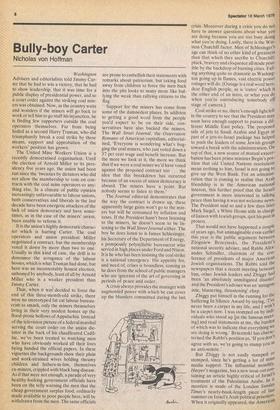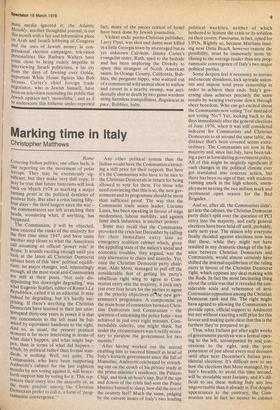Bully-boy Carter
Nicholas von Hoffman
Washington Advisers and editorialists told Jimmy Carter that he had to win a victory, that he had, to show leadership, that it was time for a public display of presidential power, and so a court order against the striking coal miners was obtained. Now, as the country waits and wonders if the miners will go back to work or tell him to go stuff his injunction, he is finding few supporters outside the coal operators themselves. Far from being hailed as a second Harry Truman, who did triumphantly break a coal strike by these Means, support and approbation of the workers' position has grown.
The United Mine Workers Union is a recently democratised organisation. Until the election of Arnold Miller to its presidency five years ago, the union had been run since the 'twenties by dictators who did not allow the membership to vote on contracts with the coal mine operators or anything else. In a climate of public opinion increasingly unfavourable to labour unions, both conservatives and liberals in the last decade have been energetic attackers of the lack of union democracy and have sometimes, as in the case of the miners' union, been unable to reform it.
It is the union's highly democratic charac ter which is hurting Carter. The coal operators and union president Miller negotiated a contract, but the membership voted it down by more than two to one. Usually in this kind of case, the drill is to denounce the arrogance of the labour bosses, which is what Truman had done, but here was an incontestably honest election, unbossed by anybody, least of all by Arnold Miller who is a weaker president than Jimmy Carter.
Thus, when it was decided to force the end of this three-month-old strike, there were no stereotyped fat cat labour bureaucrats to smash, only the miners themselves living in their very modest homes up the flood-prone hollows of Appalachia. Instead of the television picture of a federal marshal serving the court order on the union dictator in the back of his chauffeured Cadillac, we've been treated to watching men who have obviously worked all their lives being handed the official papers. In these vignettes the backgrounds show their plain and work-strained wives holding rheumy children and fathers-in-law, themselves ex-miners, crippled with black lung disease. As if that were not enough, a parade of very healthy-looking government officials have been on the telly warning the men that the cheap government surplus food, ordinarily made available to poor people here, will be withdrawn from the men. The same officials are prone to embellish their statements with remarks about patriotism, but taking food away from children to force the men back into the pits looks to many more like bullying the weak than rallying citizens to the flag.
Support for the miners has come from some of the damnedest places. In addition to getting a good word from the people you'd expect to be on their side, conservatives have also backed the miners. The Wall Street Journal, the Osservatore Romano of American capitalism, editorialised, 'Everyone is wondering what's bugging the coal miners, who just voted down a 37 per cent wage and benefit increase. But the more we look at it, the more we think that if we were a coal miner we'd have voted against the proposed contract too . . . the idea that this breakdown has occurred because of an excess of union democracy is absurd. The miners have a point. But nobody seems to listen to them.'
The Journal editorial demonstrates that the way the contract is drawn up, these apparently large gains won't go to the miners but will be consumed by inflation and taxes. If the President hasn't been listening to the miners, he doesn't seem to be listening to the Wall Street Journal either, The boy he does listen to is James Schlesinger, his Secretary of the Department of Energy, a pompously polysyllabic bureaucrat who served in high places under Ford and Nixon. It is he who has been insisting the coal strike is a national emergency. His appetite for, and need of, crises is boundless, coming as he does from the school of public managers who are ignorant of the art of governing in periods of peace and order.
A crisis always provides the manager with augmented power with which he can cover up the blunders committed during the last
crisis. Moreover during a crisis you do not have to answer questions about what you are doing because you are too busy doing what you're doing. Lastly, there is the Winston Churchill factor. Men of Schlesinger's age can think of no other kind of greatness than that which they ascribe to Churchill: pluck, bravery and eloquence all made possible by the backdrop of burning cities. Failing anything quite so dramatic as Washington going up in flames, vast electric power outages will do. (Outage is a real word here, dear English people, as is `outro' which IS the other end of an intro, or what you do. when you're outroducing somebody off stage of camera.) Coal strike or no, there's enough light left in the country to see that the President maY soon have enough support to pursue a different Middle East policy. The proposed sale of jets to Saudi Arabia and Egypt as part of a jets-to-Israel package has helped to push the leaders of some Jewish groups toward a break with the administration. on top of that, a new source of mutual exacerbation has been prime minister Begin's pas' ition that old United .Nations resolutions mean nothing to him, Israel is not going to give up the West Bank. For an administration that is coming to realise that Arab friendship is in the American national interest, 'this further proof that the Israeli government is more interested in talking peace than having it was not welcome news. The President said so and a few days later Mark Siegel, a White House aide in charge of liaison with Jewish groups, quit his post in protest. That would not have happened a couple of years ago, but unimaginable even earlier this year is the public argument betwee,0 Zbigniew Brzezinski, the President s national security adviser, and Rabbi Alex ander Schindler, chairman of the con
ference of presidents of major American Jewish organisations. The Rabbi told the
newspapers that a recent meeting between him, other Jewish leaders and Zbiggy had been 'an absolutely unmitigated disaster and the President's adviser was an `antagonistic, blustering, threatening' chap. Zbiggy put himself in the running for the Suffering In Silence Award by saying, `I'v? never been a carpet in my life, and I won,t be a carpet now. I was stomped on by inc11
viduals who stood up tat the famous meeting] and read statements at me, the burden
of which was to indicate that everything vie are doing is wrong.' Brzezinski has charae: tensed the Rabbi's position as, 'If you don t agree with us, we're going to stamp yot1 as an anti-semite.'
But Zbiggy is not easily stamped of stomped, since he's getting a lot of mass media support. The influential monthly, Harper's magazine, has a new issue out coltaining an article highly critical of Israel.s treatment of the Palestinian Arabs. In It mention is made of the London SundaY Times's nearly-book-length piece of last summer on Israel's Arab political prisoirrs' When it originally appeared, the American
mass media ignored it; the Atlantic Monthly, another thoughtful journal, is out this month with a fair and informative piece Oh Arab and Israeli lobbying of Congress and the uses of Jewish money in congressional election campaigns; television Personalities like Barbara Walters have Come close to being rudely impolite in Interviewing Israeli politicians, a far cry from the days of fawning over GoIda; anPortant White House figures like Bob Strauss, Carter's chief foreign trade negotiator, who is Jewish himself, have been on television reminding the public that Jewish opinion isn't `monolithic'; and as if to underscore this hitherto under-reported fact, many of the pieces critical of Israel have been done by Jewish journalists.
Violent ends: porno-Christian publisher, Larry Flynt, was shot and damn near killed in a little Georgia town by an enraged but as yet unknown Calvinist. Jimmy Carter's evangelist sister, Ruth, sped to the bedside and has been imploring the Divinity to spare this strangest of North American saints. In Orange County, California, Bubbles, the pregnant hippo, who waltzed out of a commercial wild animal show to wallow and cavort in a nearby swamp, was accidentally shot to death by two game wardens using harmless tranquillisers. Requiescat in pace, Bubbles, baby.



































 Previous page
Previous page